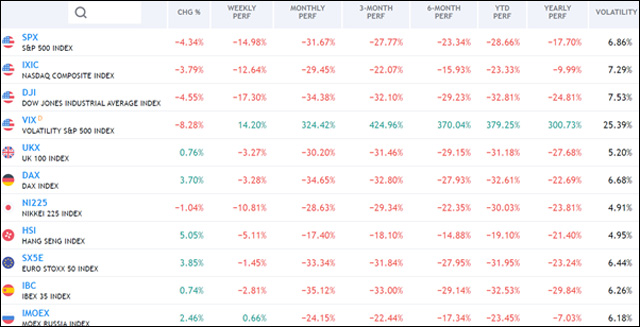More lockdowns, new emergency rate cuts, possible oil deal, falling markets, stimulus bazooka from the U.S. and the rise of European government bond yields. The global economy is living another recession, but this time caused “voluntarily” to stop the expansion of the coronavirus, and not as a consequence of serious imbalances in the economy such as those in 2008. However, the consequences are equally negative. In case things continue deteriorating, rating agencies could soon downgrade many of BBB-rated companies in light of the market turmoil, converting them into so-called fallen angels.
For the past week, S&P 500 fell 15%, Nasdaq Composite lost 12,6%, Industrial Dow Jones decreased 17,30%, UX 100 Index went down by 3,27%, DAX registers a 3,28% downgraded, whereas Euro Stoxx 50 Index fell -1,45%. Nikkei 225 rested 10,81%, while the Hang Seng Index decreased 5,11%. Finally, Russian Moex Index grew 0,66%, whilst Spanish Ibex 35 lowered 2,81%.

In order to prevent further destruction of the economy, the House plan calls for a money-financed fiscal program, to fund automatic stabilizers in the form of at least $2,000 for every adult and an additional $1000 for every child for each month of the crisis. All consumer and small business credit payments (including mortgages, car notes, student loans, credit cards, small business loans, personal loans, etc.) would be suspended during the pandemic. The Federal Reserve or Treasury would also establish a facility to reimburse creditors, and servicers for lost revenue and expenses, including payment advances. No negative credit reporting would be allowed during this time, and debt collection would be prohibited.
The European Central Bank on Wednesday, in turn, said it would spend €750 billion on “emergency” bond purchases to counter the serious risks to the monetary policy transmission mechanism and the outlook for the euro area posed by the outbreak and escalating diffusion of the coronavirus, COVID-19. The press release adds that the Governing Council will terminate net asset purchases under PEPP once it judges that the coronavirus Covid-19 crisis phase is over, but in any case not before the end of the year.
As well noted by IHS Markit:
- Government finances face severe pressure, through curtailed revenues and higher outlays: even countries with sound finances and safe-haven status like Germany face deteriorating economic and fiscal dynamics.
- Investor confidence is clearly badly damaged, with a flight to cash. This will force further asset liquidations and is likely to lead to funds facing liquidity squeezes forcing “lock-ins”.
- Increased government bond yields imply mark to market losses for on their government bond holdings, exacerbating capital pressures.
- Risk aversion – and the collapse in bank share prices – removes scope for financial entities to raise new capital: with asset quality deterioration and capital positions facing severe pressures, recourse to government help to preserve structural stability is increasingly likely.
In conclusion, movements will continue sharp and subject to sudden changes.
Macroeconomic data
- Job openings came in at 6.963M for January, above the expected 6.400M.
- Housing starts came in at 1.599M for February, above the expected 1.520M.
- Existing home sales came in at 5.770M for February, above the expected 5.500M.
- Industrial production rose 0.6% m/o/m, above the expected increase of 0.4%.
- Same-store sales rose 8.5% w/o/w, above the previous increase of 6.0%.
- Jobless claims rose 70k w/o/w from 211k to 281k.
- Home mortgage apps fell 1.0% w/o/w, below the previous increase of 6.0%.
- Retail sales fell 0.5% m/o/m, below the expected increase of 0.2%.
- Business inventories fell 0.1% m/o/m, below the previous increase of 0.1%.
- The housing market index stands at 72 for March, below the expected 74.
This week’s economic events
Monday. US Chicago Fed Index (February).
Tuesday. French, German, eurozone mfg & services PMIs (March, flash), UK mfg & services PMI (March, flash), US services & mfg PMI (March, flash), and US new home sales (February).
Wednesday. German IFO business climate index (March, final), UK CPI (February), US durable goods orders (February) and US EIA crude inventories (w/e 20 March).
Thursday. BoE rate decision and US GDP (Q4, final).
Friday. US personal income & spending (February) and US Michigan consumer confidence (March, final).







